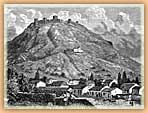 |

The Third National Assembly took place under different conditions
than the two previous ones. The civil conflicts of 1824 had
terminated, without however solving the organizational weaknesses
of the central administration, while the persecutions of the
defeated continued even when Ibrahim had landed in the Peloponnese
(beginning of 1825). The preparations for the organization
of a National Assembly which had begun in September 1825 did
not advance in these conditions. Conversely, the rival factions
were reorganized, creating renewed tension. Finally, the Third
National Assembly opened its proceedings on 6 April 1826 at
Piada, but was soon interrupted because of the fall of Missolongi.
In the meantime it was decided that the Greeks had to appeal
to Great Britain to intervene and determine the terms of the
negotiation, while a new administration, called the Administrative
Committee, was formed. In autumn of the same year (1826) attempts
were made to call another National Assembly, but without success.
Conversely, small-scale civil conflicts broke out in Corinthia
and Nauplion while at the beginning of 1827 the rival factions
organized separate assemblies at Aegina and Ermioni. Finally
the assemblies were united at Troizina at the end of March
1827, thus expressing the wish of both sides to achieve a
common political agreement. The Third National Assembly was
completed at the beginning of May with two important decisions.
The first involved the voting of a new constitution which
would no longer be provisional. Among other provisions, the
Political Constitution of Greece redefined the terms
of negotiation with the Ottoman Empire seeking independence
and not autonomy. Finally, the creation of a one-member administrative
organ which would be at the head of the executive power was
decided upon. Thus, the office of the Governor was instituted.
Ioannis Kapodistrias was chosen for this position with a seven-year
term of office. In August of the same year (1827) Kapodistrias
accepted the proposition of the National Assembly. Until his
arrival a special cice-governmental Committee would assume
his duties as it was formed for this purpose.
Kapodistrias managed quickly to suspend the Constitution of Troizina, which had been formed in such a way as to restrict his power and control his acts.
In the place of the Parliament a new organ was created, the Panellinio, which was only of a consultative character. About one and a half year after the appointment of Kapodistrias the Fourth National Assembly (Argos, 11 July-6 August 1829) ratified the powers concentrated in the hands of the Governor.
In addition, instead of the Panellinio, which was abolished, a Senate with fewer members and which lacked ultimate authority, was formed.
Finally, the fundamental principles of a future constitutional revision were defined. Such a thing never came about. The sharpening of political opposition and the assassination of Kapodistrias during the preparations for the organization of the Fifth National Assembly led to a new round of civil conflicts.
In fact, the two groups proceeded to organize two separate national assemblies, the acts of which had no importance other than that of supporting the two sides during the conflicts.
|
 |